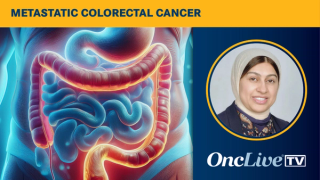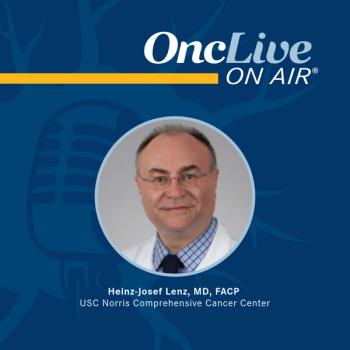
Colorectal Cancer
Latest News
Video Series

Latest Videos
Shorts





Podcasts
CME Content
More News

The top 5 OncLive TV videos of the week cover insights in multiple myeloma, myelodysplastic syndrome, breast cancer, colorectal cancer, and cervical cancer.

The FDA has approved the Guardant360 CDx as a companion diagnostic for encorafenib in patients with mCRC harboring BRAF V600E mutations.

The top 5 OncLive TV videos of the week cover insights in multiple myeloma, breast cancer, and colorectal cancer.

Experts reflect on pivotal data from the 2026 Gastrointestinal Cancers Symposium that are set to change practice in HCC, CRC, and other GI cancers.

Encorafenib plus cetuximab and FOLFIRI significantly improved response vs standard therapy in first-line BRAF V600E–mutant metastatic colorectal cancer.

Phase 2 data showed atezolizumab plus bevacizumab led to limited responses in patients with metastatic colorectal cancer and an MSI-like gene signature.

The FDA cleared narsoplimab for TA-TMA, an NDA seeking approval of bezuclastinib in nonadvanced systemic mastocytosis has been submitted, and more.

China’s NMPA approved ipilimumab N01 plus sintilimab as neoadjuvant therapy for stage IIB to III resectable MSI-H/dMMR colon cancer.

Signatera MRD positivity predicted improved DFS and OS with adjuvant celecoxib plus chemotherapy vs placebo in resected colorectal cancer.

Muzastotug has been granted fast track designation by the FDA for use in combination with pembrolizumab as treatment for patients with MSS mCRC.

Read the most notable updates to the latest versions of the NCCN Clinical Practice Guidelines in Oncology across tumor types ahead of 2026.

Anwar Saeed, MD, discusses findings of zanzalintinib plus atezolizumab in previously treated metastatic colorectal cancer.

A phase 2 study is using ctDNA positivity to select patients with CRC who may benefit from treatment with the CSF1R-directed antibody AMB-05X.

Adjuvant therapy was associated with ctDNA clearance and improved DFS in patients with resectable stage I to IV CRC.

The phase 2 trial of porustobart plus tislelizumab showed antitumor activity and manageable safety in heavily pretreated MSS metastatic colorectal cancer.

Zanzalintinib plus atezolizumab demonstrate potential chemotherapy-free option in previously treated metastatic CRC.

Nivolumab plus ipilimumab improved PFS and response rates vs nivolumab alone in MSI-H/dMMR mCRC, with no new safety concerns.

Sirexatamab plus bevacizumab shows promise in improving survival for patients with DKK1-high metastatic colorectal cancer.

Researchers from UCSF discovered that a combination of immunotherapies can reprogram the immune environment of colon cancer tumors in the liver.

NG-350A has been awarded fast track designation from the FDA for rectal cancer and is under further evaluation in the FORTRESS trial.

Three experts share their perspectives on the complementary relationship between randomized clinical trials and real-world evidence in colorectal cancer.

See poll results highlighting the top gastrointestinal oncology abstracts and subtypes to watch at the 2025 ESMO Congress.

Vote on the top abstracts and topics to watch in gynecologic and gastrointestinal oncology during the 2025 ESMO Congress.

A genetic factor may explain why some patients with colorectal cancer that has spread to the liver experience liver damage after chemotherapy.

Although clinical trials are considered a “gold standard” in identifying the efficacy of treatments, real-world data help address unmet needs in colorectal cancer.





















































